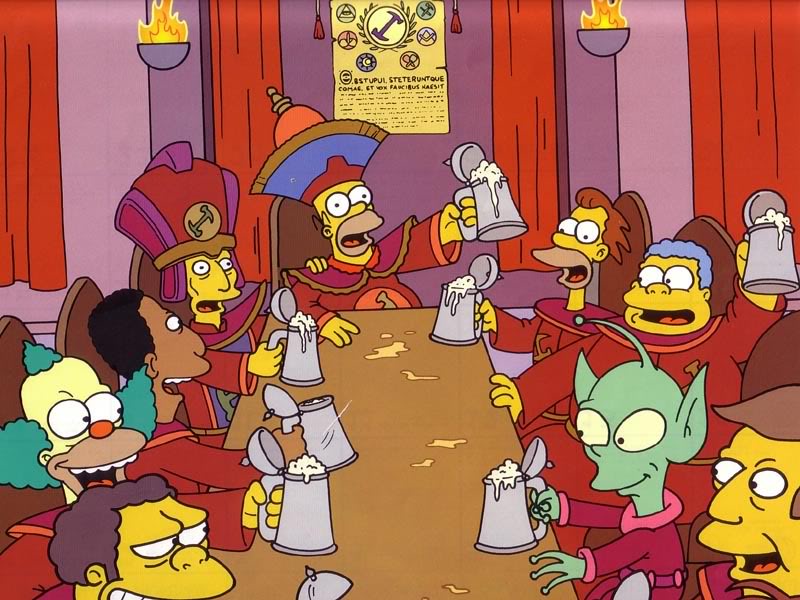The Simpsons has long been a staple of American television, known for its sharp humor, satirical take on society, and memorable characters. One of the most beloved episodes of the series is "Homer the Great," which introduces viewers to the mysterious world of the Stone Cutters. This secret society, rich in symbolism and humor, has captivated audiences since its debut. In this article, we will delve deep into the Stone Cutters, exploring their significance in the series, the cultural references they embody, and the impact they have had on fans around the world.
The Stone Cutters, as portrayed in The Simpsons, serve as a satirical representation of secret societies and exclusive organizations that exist in real life. By examining their characteristics, rituals, and the humor that surrounds them, we can gain insight into the ways The Simpsons critiques societal norms and expectations. Furthermore, understanding the Stone Cutters allows us to appreciate the clever writing and creativity that has made The Simpsons a cultural phenomenon.
Through this comprehensive analysis, we will explore various aspects of the Stone Cutters, including their origins, key episodes, fan theories, and the lasting legacy they have left on the show and its viewers. By the end of this article, you will have a thorough understanding of the Stone Cutters and their place in The Simpsons universe.
Table of Contents
- 1. The Origins of the Stone Cutters
- 2. The Stone Cutters in "Homer the Great"
- 3. Rituals and Symbolism of the Stone Cutters
- 4. Key Characters and Their Roles
- 5. Cultural References and Parodies
- 6. Fan Theories and Interpretations
- 7. The Legacy of the Stone Cutters
- 8. Conclusion and Final Thoughts
1. The Origins of the Stone Cutters
The Stone Cutters were first introduced in Season 6, Episode 12 of The Simpsons, titled "Homer the Great." This episode showcases the secretive nature of the group, which Homer discovers after feeling left out of the exclusive club. The Stone Cutters are depicted as a parody of real-life secret societies, reminiscent of organizations like the Freemasons.
In the episode, the Stone Cutters' motto, "We Do What We Want," encapsulates their rebellious spirit and highlights the absurdity of the exclusivity associated with such groups. The show's creators cleverly use humor to critique the seriousness with which many people approach secret societies, painting them in a lighthearted manner.
2. The Stone Cutters in "Homer the Great"
"Homer the Great" is a pivotal episode that sets the stage for the Stone Cutters' lore within The Simpsons. The plot revolves around Homer's quest for acceptance and belonging, ultimately leading him to join the Stone Cutters after discovering their secret lair.
Throughout the episode, viewers are treated to humorous moments that showcase the group's eccentric rituals, including the initiation ceremony, which is filled with absurdity and satire. This episode not only introduces the Stone Cutters but also emphasizes the importance of friendship and community, as Homer learns the value of being true to oneself rather than conforming to societal pressures.
3. Rituals and Symbolism of the Stone Cutters
The Stone Cutters are known for their elaborate rituals and symbols, which serve as a parody of real-life secret societies. Some notable aspects include:
- **The Stone Cutter's Oath**: A humorous take on the solemn vows made in real secret societies.
- **The Stone Cutter's Robes**: The members wear distinctive robes, which adds a layer of absurdity to their exclusivity.
- **The Stone**: The symbol of the Stone Cutters, representing both their craft and the weight of their secrets.
These elements contribute to the comedic tone of the episode while simultaneously providing commentary on the nature of exclusivity and the lengths people will go to belong.
4. Key Characters and Their Roles
The Stone Cutters are made up of a variety of characters, each bringing their unique flair to the group. Key figures include:
- **Homer Simpson**: The protagonist who seeks acceptance.
- **Lenny Leonard**: One of Homer's close friends and a fellow Stone Cutter.
- **Carl Carson**: Another of Homer's friends, often seen alongside Lenny.
- **The Leader**: A mysterious figure representing authority within the group.
Each character's interactions and dynamics help to further the comedic narrative of the Stone Cutters and illustrate the absurdity of their rituals.
5. Cultural References and Parodies
The Stone Cutters are rich with cultural references, drawing inspiration from various secret societies and organizations. The episode itself includes nods to:
- **Freemasonry**: The Stone Cutters share similarities with the Freemasons, including their secretive nature and rituals.
- **The Illuminati**: The episode hints at conspiracy theories surrounding secret societies and their influence on society.
- **The Knights Templar**: Another organization that has been the subject of many myths and legends.
These references enhance the episode's comedic value while inviting viewers to reflect on the real-world implications of such societies.
6. Fan Theories and Interpretations
The Stone Cutters have sparked numerous fan theories and interpretations since their introduction. Some popular theories include:
- **The Stone Cutters as a Metaphor for Conformity**: Many fans believe that the Stone Cutters represent societal pressures to conform and belong.
- **Exploration of Power Dynamics**: The group's hierarchy reflects real-world power structures and the absurdity of social climbing.
- **Commentary on Masculinity**: The episode critiques traditional notions of masculinity and the lengths men go to prove themselves.
These theories highlight the depth of The Simpsons' writing and the show's ability to resonate with viewers on multiple levels.
7. The Legacy of the Stone Cutters
The Stone Cutters have left a lasting legacy within The Simpsons and popular culture. Their memorable motto and rituals have become iconic, and the episode "Homer the Great" is often cited as one of the best in the series. The Stone Cutters have been referenced in various forms of media, showcasing their impact beyond the show.
Moreover, the themes explored in the episode continue to resonate with audiences, emphasizing the importance of authenticity and community in a world that often prioritizes exclusivity.
8. Conclusion and Final Thoughts
In conclusion, the Stone Cutters serve as a brilliant satire of secret societies and the absurdity of exclusivity. Through their memorable rituals, humorous interactions, and cultural references, they encapsulate the essence of what makes The Simpsons a beloved show. The episode "Homer the Great" not only entertains but also prompts viewers to reflect on societal norms and the importance of being true to oneself.
We invite you to share your thoughts on the Stone Cutters and their impact on The Simpsons. Leave a comment below, and don't forget to check out our other articles for more insights into your favorite shows and characters!
Thank you for reading, and we hope to see you again soon!
Discovering The Sweet World Of Hannah's Sweets: A Comprehensive Guide
Rip Sister Poem: A Heartfelt Tribute To Lost Loved Ones
Manchester Air Departures: Your Comprehensive Guide To Flying From Manchester Airport


